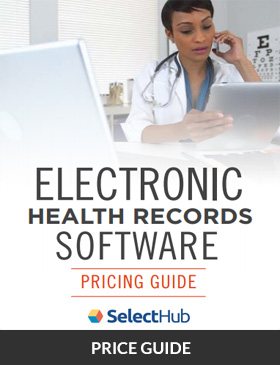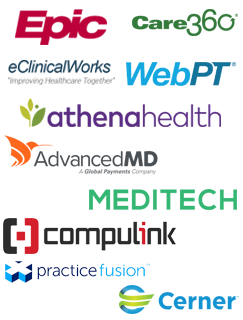
Resources for Software Selection
Most Popular Articles
Recent Articles
Reports and Research
Quickly find the best assets available for your EHR selection research here. Our Market Research Analysts have clearly summarized and reviewed each asset to help you select only the assets you need.
Confidence Comes from Data
EHR software selection is complex and beset with problems for both IT buyers and solution providers. We do 3 things to make it fast and simple:
FREE Software Selection Platform
Our platform provides best-practices, including requirements templates & vendor comparisons, to help you make the right decisions for your unique needs, in a fraction of the time. Try it FREE.
Aggregated Reviews
We have collected every software review available online, crunched every last word using our proprietary Sentiment Analysis algorithms, all so we can tell you how a software product is viewed in its marketplace, retrospectively.
Professional Analysis
We relentlessly collect and analyze data about software, then compile and share it so every company has the same access to the information. The information we gain is then used in our Software Selection platform to help you find the right software.
Your Guides
Our Industry Journalists proudly distill the helpful information you read on SelectHub, always on the mission to share what matters to you can make your best decisions independently.
EHR articles are written and edited by:
As SelectHub’s Content Manager, Zachary Totah leads a team of more than 35 writers and editors in their quest to provide content that helps software buyers find the right system for their company.
Ryan McElroy is a Content Editor and Senior Market Analyst at SelectHub who writes content on EHR, EMR, home health, telemedicine and construction scheduling.
Kashish Arora is a Technical Writer at SelectHub. She pursued her master’s degree in Journalism from Symbiosis Institute of Media and Communication.
Most Recent Articles
Medical software has become a staple of the healthcare industry in recent years. From EMR/EHR and practice management software to medical billing and patient scheduling, there are a wide variety of options as well as tools and features when it comes to medical software. These medical features offer a number of benefits to help with healthcare organizations from small specialty clinics to larger hospital systems. In this article, we’ll explore the EHR/EMR trends to expect in 2024. Software as a Medical Device, or SaMD, can be described as a class of medical software designed to carry out one or more medical functions without the need for actual hardware. This can comprise of software or applications intended to treat diagnose, cure, mitigate or prevent disease. SaMD is typically used with non-medical computing platforms connected to virtual networks or other general-use hardware. Understanding which features and tools your organization will benefit from can take time and effort. Here, we’ll highlight critical current and future healthcare technology trends to help your facility stay ahead of the curve. Electronic Health Records, or EHR software, have numerous advantages for health care practices and practitioners, especially since the Affordable Care Act (ACA) and the Medicaid EHR incentive programs were passed. EHR makes it possible for patients and physicians to access medical files digitally. This ease of access can often help increase patient satisfaction and improve care. EHR has become an essential part of any practice, so much so that even single-physician practices can’t afford to go without them. In this article, we will take a comprehensive view of the EHR selection process so you can understand in detail how to select an EHR that will work best for you. Throughout recent years, the use of electronic health records (EHR software) and electronic medical records (EMR software) has skyrocketed, becoming standard practice for practically every single healthcare organization. With the growing use of these systems, another recent trend has been moving to the cloud. Web based electronic medical records and health records solutions have become increasingly popular, and for a number of reasons we’ll get into in this blog post. While traditional, or on-premise, EHRs are still a valuable asset for a number of healthcare facilities, cloud-based solutions typically offer more advantages and flexibility. With the increasing popularity of electronic health records (EHR software), you’ve most likely heard of an EHR incentive program — government incentives that come with the implementation and use of such systems. While software solutions already provide a number of advantages for a variety of health organizations, these monetary incentives provide additional benefits for healthcare professionals. The use of electronic health records (EHR software) and electronic medical records (EMR software) has grown increasingly popular over the years as healthcare organizations are doing everything they can to provide greater quality care and increase revenue in the process. Many people view the EHR vs EMR comparison as being one and the same, but there are important differences worth knowing.What is a Patient Portal and How Does It Help Medical Practices?
EHR Modules: A Comprehensive Guide
Best Behavioral Health EHR/EMR Software
EHR Comparison: Top EHR Software
Ambulatory EHR vs Inpatient EHR: Understanding the Important Differences
Key Medical Software Features And Requirements
EMR/EHR RFP Best Practices
Future of Electronic Health Records: What To Expect in 2024
EMR/EHR Evaluation Criteria Checklist for Platform Selection
SaMD: Everything You Need to Know About Software as a Medical Device
Top EMR / EHR Software Vendors List
Key Benefits of Electronic Health Records (EHR)
Top Healthcare Technology Trends For 2023
Ultimate Guide to EHR Selection
Best Web-Based EMR / EHR Software
EHR Incentive Program and Why It Pays to Participate
Practice Management and EHR: Key Differences Between Them
8 Ways to Maintain Better Health Care Information Security
EHR Integration: The Comprehensive Guide
EHR vs EMR: The Difference Between Them












